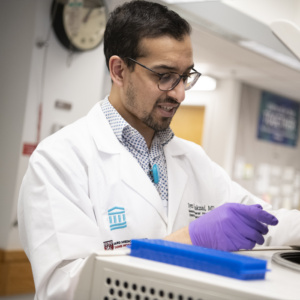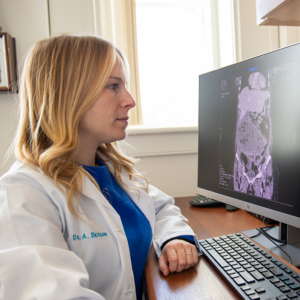VINCENT FELLOWS IN GYNECOLOGIC ONCOLOGY
Pursuing Women’s Cancers
Each year, approximately 95,000 women in the United States are diagnosed with gynecologic cancer including the five main types — ovarian, cervical, uterine, vaginal and vulvar cancer. Unfortunately, more than 30,000 will die. With support from The Vincent Memorial Hospital Foundation, Vincent fellows in Gynecologic Oncology are seeking new ways to improve outcomes and save lives.

What Are the Mechanisms of Resistance to ‘Antibody Drug Conjugate Therapy' in Ovarian Cancer?
William Manning, MD, is a Vincent fellow in Gynecologic Oncology currently investigating the mechanisms of resistance to antibody drug conjugate (ADC) therapy in ovarian cancer. This therapy combines an antibody to a specific tumor-associated target with a cytotoxic payload that is taken up by the tumor cells upon binding. While effective for some ovarian cancers, there is evidence for resistance mechanisms that allow the cancer to progress and evade ADC therapy. Dr. Manning is investigating these resistance mechanisms by creating models of cancer cell lines from patients whose cancers developed resistance to the therapy. His research involves growing and assessing organoids, which are three-dimensional cultures derived from tumor cells that replicate much of the cellular complexity of the primary tumor. This research will help determine the optimal sequencing of ADC therapy and elicit mechanisms of resistance that may be targetable to enhance or extend the benefits of therapy.
Faculty Mentor
Oladapo Yeku, MD, PhD, Director of Translational Research, Gynecologic Oncology Program
Career Path
MD: University of Texas Health Science Center at San Antonio, 2015-2019
OB/GYN Residency: Women and Infants Hospital of Rhode Island, Brown University, 2019–2023
Vincent Fellowship: Gynecologic Oncology, Vincent Department of OB/GYN, Mass General, 2023–2026

What Mechanisms Underly Resistance to 'Bispecific T-cell Engager Therapy' for Advanced or Recurrent Serous Ovarian Cancer?
Syem Barakzai, MD, a Vincent fellow in Gynecologic Oncology, is assessing the activity of “bispecific T-cell engager molecules” on different cell lines of patients with advanced or recurrent serous ovarian cancer who are participating in clinical trials. Bispecific T-cell engager molecules are a class of monoclonal antibodies that direct a host’s immune system — specifically the cytotoxic T cell — against cancer cells. They are bispecific because they form a link between T cells and cancer cells, activating the T cell to kill the cancer cell. In laboratory studies, Dr. Barakzai is assessing blood and tumor samples from patients who have progressed through taking this investigational therapy, seeking possible characteristics that contribute to a good or poor response. This research will help clinicians determine suitable candidates for this novel ovarian-cancer treatment and suggest future combination therapies.
Faculty Mentor
Oladapo Yeku, MD, PhD, Director of Translational Research, Gynecologic Oncology Program; Associate Member, VCRB; Member, Center for Cellular Therapeutics, Mass General; Member, Henri and Belinda Termeer Center for Targeted Therapeutics
Career Path
MD: Tulane University School of Medicine, 2014–2018
OB/GYN Residency: University of Southern California. 2018–2022
Vincent Fellowship: Gynecologic Oncology, Vincent Department of OB/GYN, Mass General, 2022–2025

What Are the Barriers to Accessing High-quality Vulvar Cancer Care?
Alexandra Bercow, MD, is a Vincent fellow in Gynecologic Oncology and research fellow at the Center for Surgery and Public Health at the Harvard T.H. Chan School of Public Health. Her research involves analyzing information from national clinical databases to identify deficits and disparities in the treatment of vulvar cancer, a rare gynecologic malignancy. She is currently using the National Cancer Database, a U.S. cancer registry with over 70,000 records of women with vulvar cancer, to identify gaps in appropriate treatment of early-stage vulvar cancer and how it affects patient outcomes in order to develop clinical strategies and healthy policies to improve these disparities.
Faculty Mentors
Vincent Fellowship in Gynecologic Oncology
Eric Eisenhauer, MD, Division Director and Fellowship Director, Vincent OB/GYN Division of Gynecologic Oncology
Amy Bregar, MD, Associate Fellowship Director, Vincent OB/GYN Division of Gynecologic Oncology
Center for Surgery and Public Health Fellowship
Christina Minami, MD MS, Surgeon, Division of Breast Surgery, Brigham and Women’s Department of Surgery
George Molina, MD MPH, Surgeon, Division of Surgical Oncology, Brigham and Women’s Department of Surgery
Career Path
MD: College of Physicians and Surgeons, Columbia University, 2013–2017
OB/GYN Residency: Brigham and Women’s Hospital/Massachusetts General Hospital Integrated Residency Program. 2017–2021
Vincent Fellowship: Gynecologic Oncology, Vincent Department of OB/GYN, Mass General, 2021–2024
